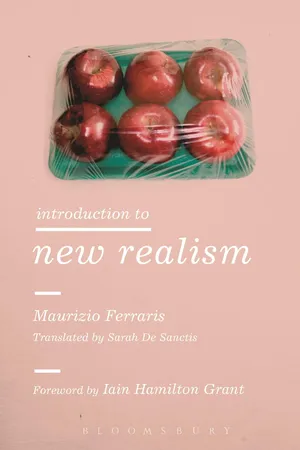
- 160 pages
- English
- PDF
- Available on iOS & Android
Introduction to New Realism
About this book
Introduction to New Realism provides an overview of the movement of contemporary thought named New Realism, by its creator and most celebrated practitioner, Maurizio Ferraris. Sharing significant concerns and features with Speculative Realism and Object Oriented Ontology, New Realism can be said to be one of the most prescient philosophical positions today. Its desire to overcome the postmodern antirealism of Kantian origin, and to reassert the importance of truth and objectivity in the name of a new Enlightenment, has had an enormous resonance both in Europe and in the US. Introduction to New Realism is the first volume dedicated to exposing this continental movement to an anglophone audience. Featuring a foreword by the eminent contemporary philosopher and leading exponent of Speculative Realism, Iain Hamilton Grant, the book begins by tracing the genesis of New Realism, and outlining its central theoretical tenets, before opening onto three distinct sections. The first, 'Negativity', is a critique of the postmodern idea that the world is constructed by our conceptual schemas, all the more so as we have entered the age of digitality and virtuality. The second thesis, 'positivity', proposes the fundamental ontological assertion of New Realism, namely that not only are there parts of reality that are independent of thought, but these parts are also able to act causally over thought and the human world. The third thesis, 'normativity, ' applies New Realism to the sphere of the social world. Finally, an afterword written by two young scholars explains in more detail the relationship between New Realism and other forms of contemporary realism.
Tools to learn more effectively

Saving Books

Keyword Search

Annotating Text

Listen to it instead
Information
Table of contents
- Cover page
- Halftitle page
- Series page
- Title page
- Copyright page
- Contents
- Foreword The three dogmas of transcendentalism
- A few introductory remarks
- Part One Negativity
- Part Two Positivity
- Part Three Normativity
- Afterword The coral reef of reality: new philosophical realisms
- Notes
- Bibliography
- Index
Frequently asked questions
- Essential is ideal for learners and professionals who enjoy exploring a wide range of subjects. Access the Essential Library with 800,000+ trusted titles and best-sellers across business, personal growth, and the humanities. Includes unlimited reading time and Standard Read Aloud voice.
- Complete: Perfect for advanced learners and researchers needing full, unrestricted access. Unlock 1.4M+ books across hundreds of subjects, including academic and specialized titles. The Complete Plan also includes advanced features like Premium Read Aloud and Research Assistant.
Please note we cannot support devices running on iOS 13 and Android 7 or earlier. Learn more about using the app